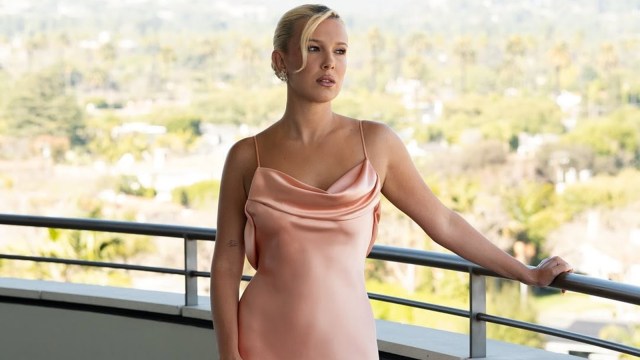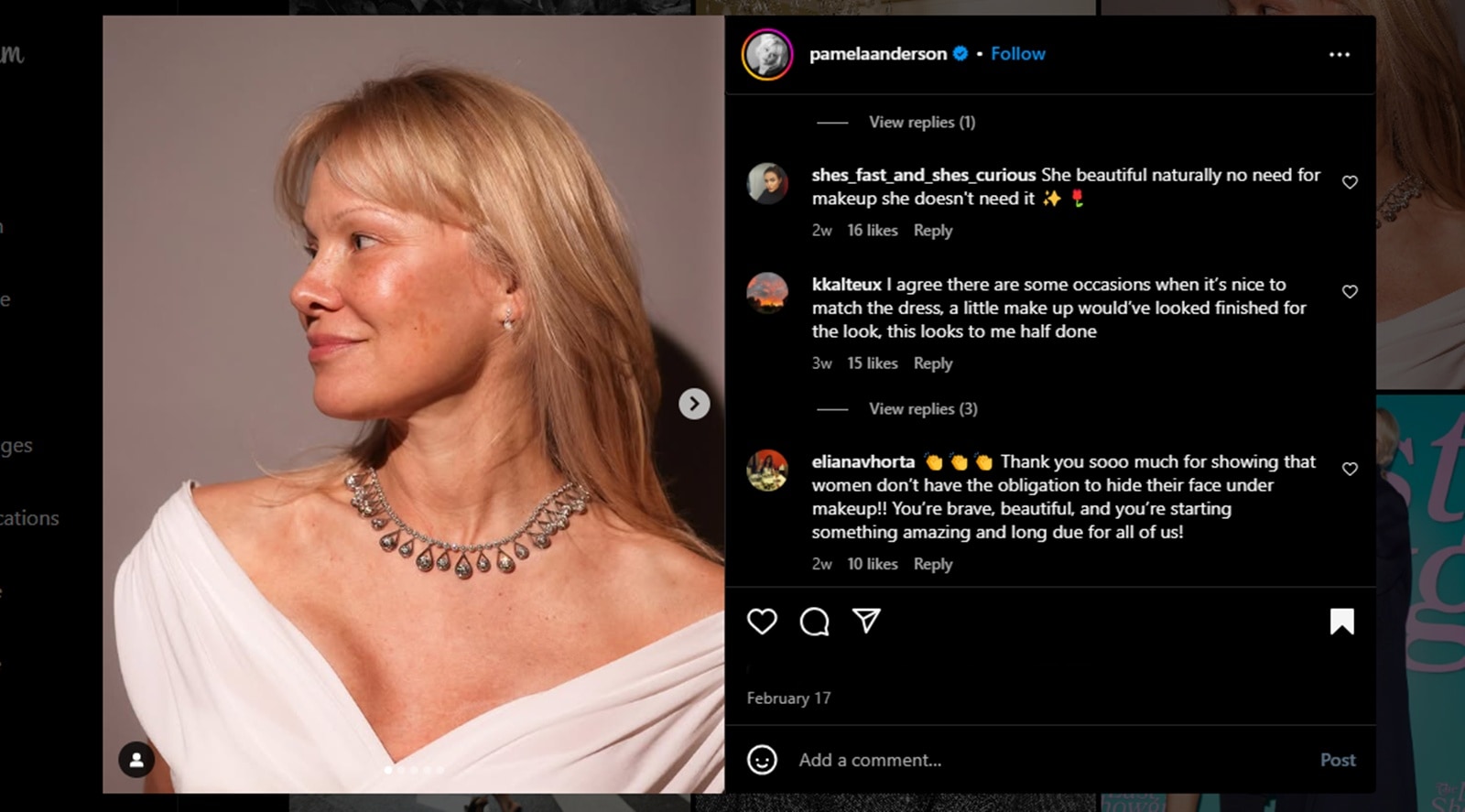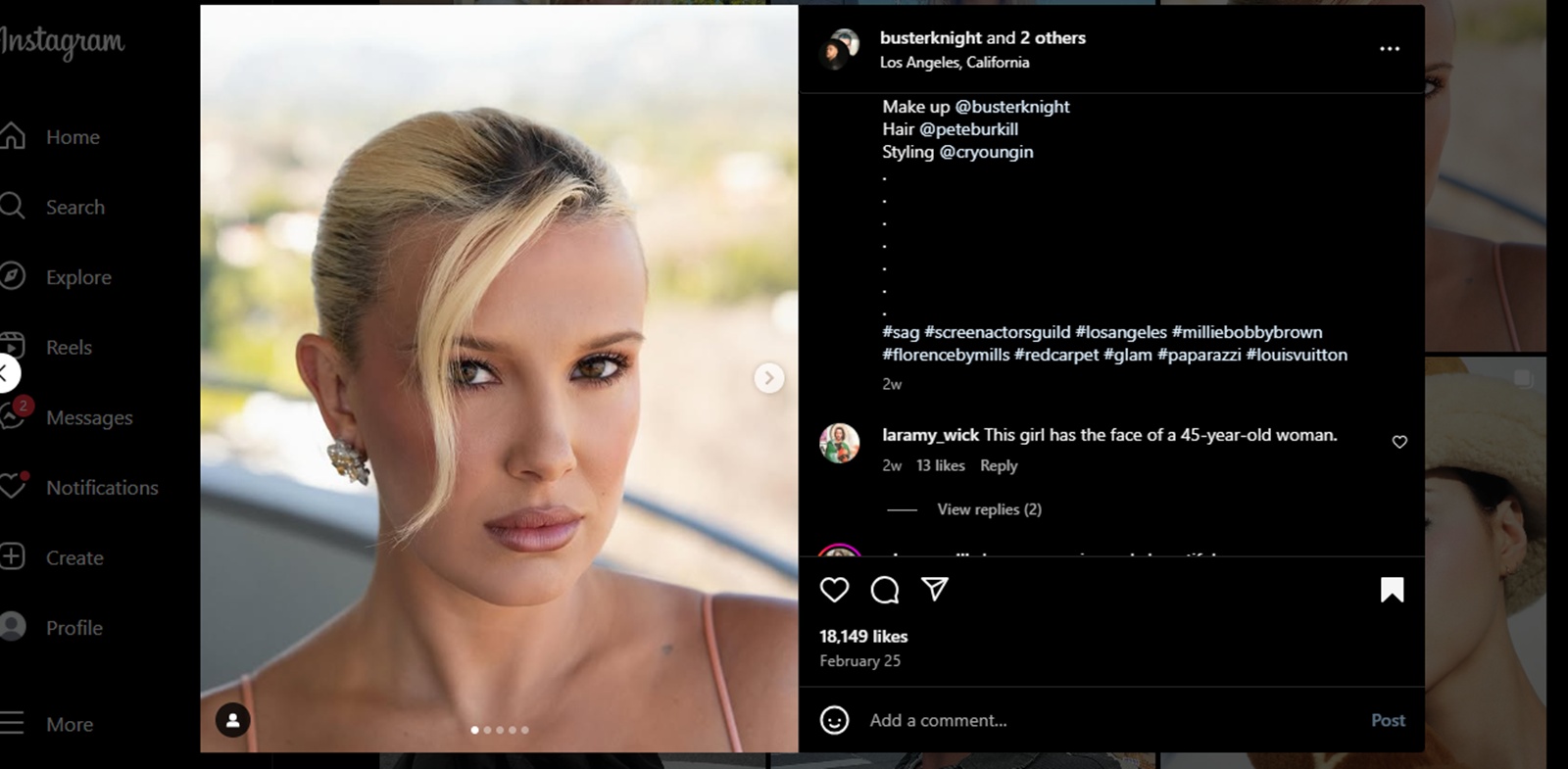📣 For more lifestyle news, click here to join our WhatsApp Channel and also follow us on Instagram
From Millie Bobby Brown to Pamela Anderson: Why are we so afraid of a woman growing older on her own terms?
Brown’s experience is a symptom of our broader cultural obsession with women’s ageing, pushing them to look mature when young and youthful when older. If a woman embraces her age—whether that means looking “too young” or “too old”—she becomes a problem.
 Why are we so terrified of women ageing? From Millie Bobby Brown to Pamela Anderson, society refuses to let women grow older on their own terms. It’s time to change the narrative. (Source: Louis Vuitton/Instagram)
Why are we so terrified of women ageing? From Millie Bobby Brown to Pamela Anderson, society refuses to let women grow older on their own terms. It’s time to change the narrative. (Source: Louis Vuitton/Instagram)I was 12 when the electrician uncle—thrice my age—looked at me and said, “Beta, aap apni umar se zyada badi lagti ho. Aise kapde toh bacche pehente hain.” (You look much older than your age. The clothes you are wearing are meant for kids.)
I was wearing my favourite yellow and green striped tank top with a pair of jorts, an outfit I had chosen with the thoughtless joy of childhood. But his words, heavy with something unsaid, settled on my skin like dust—like the first shadow of a storm I didn’t yet understand.
He was the first, but certainly not the last.
In the years that followed, I would hear many versions of the same sentiment—sometimes whispered, sometimes thrown like a stone—until it became clear that girlhood, for me, was something conditional, something I had failed to preserve. If my body had undergone puberty early, as is true for many girls now, then I must carry myself as a woman, erase the remnants of childhood.
And yet, as I stepped fully into womanhood—becoming the 25-year-old adult I am today—the expectation shifted once more. Now, the world demands that I shrink myself back, that I grasp at youth with desperate fingers.
We are never allowed to simply exist. Millie Bobby Brown knows it too well.
The actor turned 21, and the Internet reacted as though she had committed a crime. “She looks 30!” the most benign of comments read, thick with disapproval, as if time itself had wronged her.
Brown was quick to respond. “I started in this industry when I was 10 years old. I grew up in front of the world, and for some reason, people can’t seem to grow with me. Instead, they act like … I should still look the way I did on Stranger Things season one. And because I don’t, I’m now a target,” she said in a video uploaded to her Instagram.
View this post on Instagram
It is a curious thing, this collective discomfort we feel when a young woman dares to look her age. What, exactly, is the crime? That she has shed the softness of childhood? That her face now carries the echoes of laughter, of lessons learned, of late nights and early mornings?
Brown’s experience is a symptom of our broader cultural obsession with women’s ageing. When we’re young, we’re expected to look mature. When we grow older, we’re expected to cling desperately to youth. If a woman embraces her age—whether that means looking “too young” or “too old”—she becomes a problem.
Pamela Anderson understands this contradiction better than most.
Once the sun-kissed siren of Baywatch, frozen in time with slow-motion waves lapping at her feet, Anderson, now at 56, stands before the world stripped of artifice––barefaced and unapologetic.
“Anti-ageing is a lie,” she said in a 2023 interview with Glamour. “We’re getting older no matter what. Things change, and if you can find a sense of humour in it, it’s better.”
Anderson’s decision to step into the light without makeup, without the carefully constructed illusion of eternal youth, has been met with gasps of admiration—and of horror. The comments spill across screens: “She looks older than her age. What has she done to herself?”
 Anderson’s decision to step into the light without makeup, without the carefully constructed illusion of eternal youth, has been met with gasps of admiration—and of horror (Screenshot from Instagram)
Anderson’s decision to step into the light without makeup, without the carefully constructed illusion of eternal youth, has been met with gasps of admiration—and of horror (Screenshot from Instagram)
The impossible standard
This is the paradox of being a woman: to age too quickly is a tragedy, but to age at all is an offense.
Cinema has long been a mirror that reflects only the version of womanhood it deems acceptable. Older women are not absent from the screen, but they are often seen through the lens of their defiance—praised for “not looking their age,” for their ability to cheat time rather than embrace it.
And now, in the digital era, the scrutiny has only intensified. Social media has become a stage upon which we are all unwilling performers, our faces magnified, dissected, analysed. AI filters smooth away lines, erasing the passage of years with a single tap, while the “How old do I look?” trend on TikTok subjects women to the cold, unflinching gaze of strangers.
It is not enough to live well. We must live youthfully. And yet, youth itself is a fleeting currency—one that devalues in the very moment we begin to grasp its worth.
 Brown’s experience is a symptom of our broader cultural obsession with women’s ageing (Screenshot from Instagram)
Brown’s experience is a symptom of our broader cultural obsession with women’s ageing (Screenshot from Instagram)
So what if women look old?
What Brown and Anderson have in common is not merely their fame, but the world’s relentless obsession with their faces.
But I ask, so what?
So what if a woman looks old? So what if her face carries the weight of years lived, of stories told, of love given and lost? So what if she is not frozen in time, if she dares to step forward unhidden, unfiltered?
For too long, we have been told that youth is a woman’s greatest virtue—that to be desired, to be valued, is to remain untouched by time. That if we must age, we should do so in secret, our transformations hidden behind needles and creams, behind carefully curated angles.
Men, of course, are given a different story. They are allowed to become silver foxes, to wear their years like a badge of honour. Their wrinkles are evidence of wisdom, their salt-and-pepper hair a sign of experience. But for women, ageing is a disease that must be cured—an affliction that must be softened, blurred, erased.
And yet, time will come for all of us. No amount of retinol or filler or willful ignorance can halt the slow, steady march of age. And perhaps the greatest act of rebellion is to greet it without fear.
Pamela Anderson calls it life-ing, not ageing. She has stopped chasing youth, stopped running from the inevitable. “All we can do is embrace who we are at the moment we are in and be okay with where our feet stand right now,” she said in the Glamour interview.
So let women grow older. Let our faces tell our stories. Let us exist without your unsolicited commentary and whispered judgments, and without the fear of looking like what we are—human beings who grow and change over time. Because time does not ask for permission. It moves forward, regardless.
And perhaps, if we are lucky, we will move forward with it—unafraid, unashamed, and utterly, magnificently ourselves—like Brown and Anderson. Brown is not a child anymore. Anderson is not 25 anymore. And that’s okay. They don’t owe you their youth. No woman does.
📣 For more lifestyle news, click here to join our WhatsApp Channel and also follow us on Instagram



- 01
- 02
- 03
- 04
- 05
























